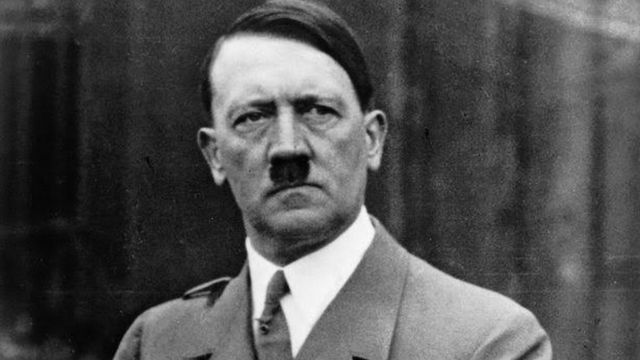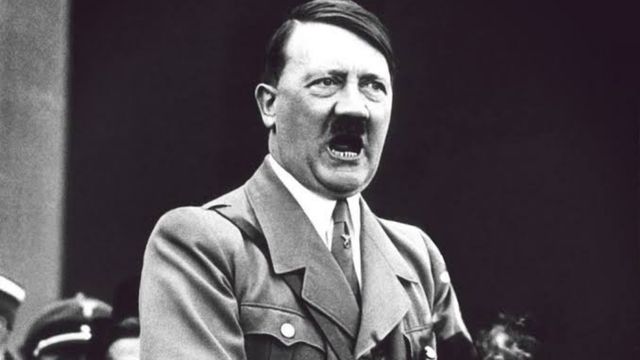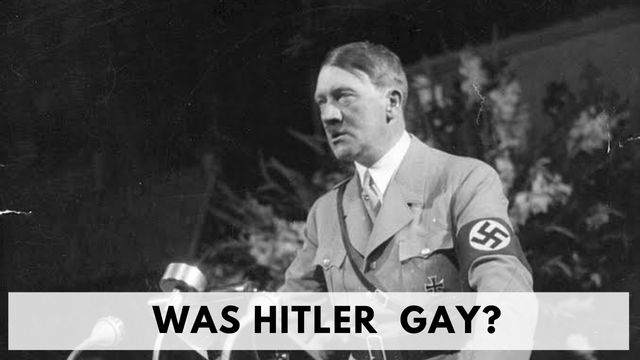The renowned German historian Lothar Machtan even claims in his book that Hitler ordered the assassination of key Nazi officials to conceal his homosexuality.
Ernst Röhm, the leader of Hitler’s Sturm Abteilung or Storm Troopers, made an effort to blackmail by threatening to reveal his sexual preferences.
Machtan, a history teacher at Bremen University, claimed that this resulted in the death of Röhm, who was gay.
He cites various historical documents to support his claims.
In 1915, the young Hitler was a despatch rider on the French front. Years after the war, before Hitler became well-known, a fellow soldier named Hans Mend stated in his memoirs: “At night, Hitler lay with Schmidl, his male whore.”
Schmidl, also known as Ernst Schmidt, and Hitler allegedly had an “inseparable love affair” for five years, according to Machtan.
Hitler’s military records claim that senior officers were hesitant to promote him due to the relationship.
Hitler was refused a promotion to non-commissioned officer owing to his homosexual activity, according to Erich Ebermeier, a lawyer and author who later looked over Hitler’s military papers.
According to Munich police reports from after World War One, Hitler was wanted for his s*xual orientation.
Machtan contends that Hitler attracted several young men to his cause as a “brown” [fascist] militant for more than simply political grounds.
According to a Munich police protocol from the early 20th century, a 22-year-old man called Joseph reported to the authorities: “I spent the whole night with him.”
Another 18-year-old named Michael stated: “I had been jobless for months, and my mother and brother were frequently hungry; thus, at his suggestion, I joined the man in his home.”
Another child called Franz said, “He asked me if I’d like to stay with him and told me his name was Adolf Hitler.
The police reports were compiled by Otto von Lossow, a German army general who helped quell the Hitler putsch in 1923.
Years later, he still kept the Munich police file as “a kind of personal life insurance.” He asserted that Hitler would have used the knowledge to blackmail him if he had attempted to push him aside.
Hitler’s interpreter and close friend Heinrich Himmler, Eugen Dollmann, initially made the police records public several years ago in Rome.
However, because his book was never made into German, historians mostly disregarded the startling discovery.

According to Machtan, Hitler was said to have been particularly captivated by Rudolf Hess, his deputy, who was popularly known as “black Emma” in the party and with whom he had spent months in Landsberg prison.
Why did the Nazis discriminate against gay people, killing hundreds of them in concentration and labour camps? Hitler “never himself condemned homosexuality, but he allowed the persecution of gays to hide his true colours,” claims Machtan.
Was Hitler Gay?
For a very long time, Adolf Hitler, who ruled Germany from 1933 to 1945, was the focus of considerable historical and academic debate, gossip, and speculation.
There is evidence that he had relationships with other women throughout his life and that he opposed homosexuality, even if there is no proof of homosexual contact.
His name has been connected to several alleged female lovers, including two who committed suicide.
A third person died of complications eight years after attempting, and a fourth person also attempted.
Adolf Hitler presented himself to the world as a celibate man without a family who was only concerned with establishing Nazi Germany as the dominant power.
He maintained his connection with Eva Braun, which lasted nearly 14 years, a secret from the broader public and everyone outside of his close friends.
The couple engaged in ordinary sex, according to Braun biographer Heike Görtemaker.
Hitler and Braun wed in late April 1945, less than 40 hours before they committed themselves together.
Why Did Adolf Hitler Matter?
Because of his acts, Hitler is considered to be of tremendous historical significance, which is not the same thing as saying that he was a good person or that his actions should be praised.
He was the one who started World War II, which ultimately led to the deaths of almost fifty million people.

His actions were responsible for this. In addition to this, it marked the beginning of a significant shift in the balance of power away from western Europe and toward the United States and the Soviet Union.
It also made it possible for a communist movement to eventually take control in China and expanded the Soviet Union’s influence in eastern, central, and Balkan Europe.
In addition to this, Hitler was the man responsible for carrying out the Holocaust, which resulted in the deaths of six million Jews and millions of other people.
How Did Adolf Hitler Become So Influential?
The beginning of Hitler’s rise to power may be dated back to 1919 when he became a member of the German Workers’ Party, which would later become the Nazi Party.
Because of his convincing oratory and clever use of propaganda, he shot to the top of the organization quite rapidly.

Hitler capitalized on the instability that the Great Depression brought about to gain support across the country and come in second place in the presidential election that year (1932).
As a direct consequence of Hitler’s extensive political manoeuvring, the victorious candidate Paul von Hindenburg chose Hitler to fill the position of chancellor in January 1933.
The blaze that broke out in the Reichstag the next month provided the rationale for a decree that abolished all safeguards for individual liberty.
After that, on March 23, the Enabling Act was passed, which ultimately gave Hitler complete authority.
After Hindenburg’s death on August 2, 1934, the chancellorship and the presidency were merged into a single position, and Hitler proclaimed Führer of Germany (leader).
Read More:-
- iOS App Store Pandahelperlite.com and How to Get Panda Helper App?
- “Go Update iOS, Chrome, and HP Computers to Fix Serious Flaws “
- Is Karl Jacobs Gay? Know More About This Youtuber!
Conclusion
Hitler had an overarching goal for territorial expansion, which was largely driven by his desire to reunify the German peoples and his pursuit of Lebensraum, which translates to “living space” and would allow Germans to become economically self-sufficient and militarily secure.
Hitler’s goal for territorial expansion was largely motivated by his desire to reunify the German people.
The overarching objective of Hitler’s geographical expansion was to reunify the German peoples, which was a primary motivation for him in this endeavour.
The severe terms of the Treaty of Versailles, which had been signed to bring an end to World War I, were reviled by a great number of Germans, and a great number of Germans embraced the opportunity to work toward such goals with open arms.
Hitler was successful in capturing Austria and Czechoslovakia in 1938 and 1939 by utilizing a variety of techniques with relatively little opposition.
These years were 1938 and 1939. Even though France and Britain had promised Poland their armed support in the case of an invasion, Germany invaded Poland the next day, on September 1, 1939.
This was even though France and Britain had guaranteed their help to Poland in the event of an attack.
After waiting another two days, both countries issued declarations of war against Germany, which was the official beginning of World War II.



Comments are closed.